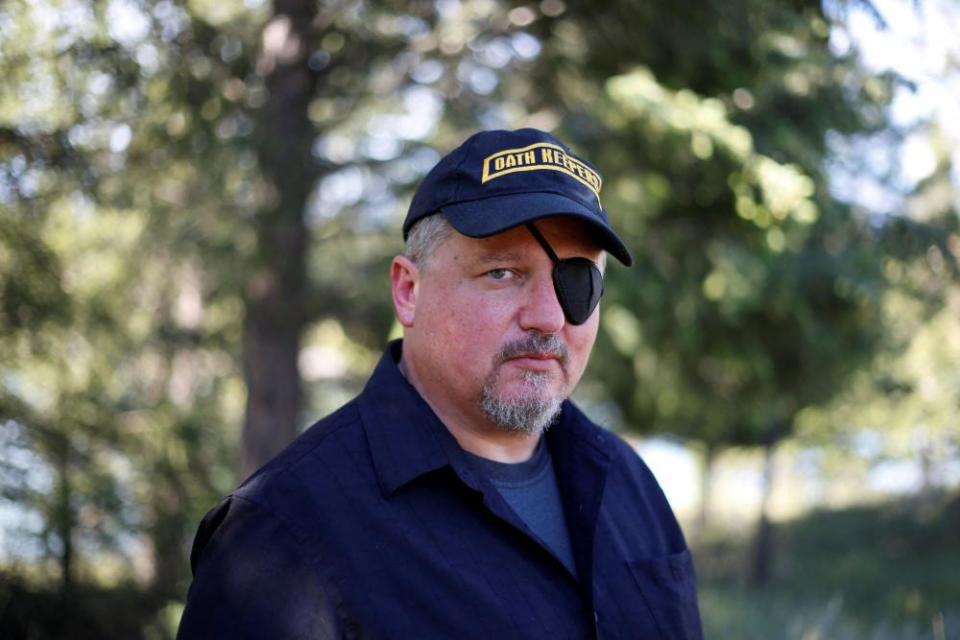Militia group leader tried to ask Trump to authorize them to stop transfer of power

- Oops!Something went wrong.Please try again later.
Stewart Rhodes, the Oath Keepers militia group leader charged with seditious conspiracy over the January 6 attack on the Capitol, asked an intermediary to get Donald Trump to allow his group to forcibly stop the transfer of power, the justice department has alleged in court papers.
The previously unknown phone call with the unidentified individual appears to indicate the Oath Keepers had contacts with at least one person close enough to Trump that Rhodes believed the individual would be a good person to consult with his request.
Related: Capitol attack committee requests cooperation from key Republican trio
Once the Oath Keepers finished storming the Capitol, Rhodes gathered the Oath Keepers leadership at about 5pm and walked down a few blocks to the Phoenix Park hotel in Washington, the justice department said on Wednesday in a statement of offense against Oath Keepers member William Wilson.
The group then huddled in a private suite, the justice department said, where Rhodes called an unidentified person on speakerphone and pressed the person to get Trump to authorize them to stop the transfer of power after the Capitol attack had failed to do so.
“Wilson heard Rhodes repeatedly implore the individual to tell President Trump to call upon groups like the Oath Keepers to forcibly oppose the transfer of power,” the document said. “This individual denied Rhodes’ request to speak directly with President Trump.”

The extraordinary phone call indicates that Rhodes believed two important points: first, that he was close enough to the Trump confidant that he could openly discuss such a request, and second, that the confidant was close enough to Trump to be able to pass on the message.
James Lee Bright, a lawyer for Rhodes, told the Guardian that he was uncertain about who his client called or whether the call took place.
The previously unknown phone call surfaced on Wednesday in charging documents against Wilson, the leader of the North Carolina chapter of the Oath Keepers, who pleaded guilty to seditious conspiracy and obstruction of an official proceeding as part of a plea agreement.
The statement of offense said that Wilson was involved in efforts to prepare for January 6 with the national leadership of the Oath Keepers, and how Rhodes added Wilson to the “DC OP: Jan 6 21” group chat on the encrypted Signal messaging app.
“Rhodes, Wilson, and co-conspirators used this Signal group chat and others to plan for January 6, 2021,” the justice department said.
On the morning of the Capitol attack, Rhodes confirmed on the group chat that they had several well equipped QRFs outside DC – a reference to quick reaction forces, that the government said it believes were on standby to deploy to the Capitol with guns and ammunition.
At about 2.34pm, the justice department said, Wilson stormed into the Capitol through the upper West Terrace doors as one of the first co-conspirators to breach the building, and by 2.38pm, was helping to pry open the doors to the rotunda from the inside.
The seditious conspiracy charge against Wilson – an offense that carries up to 20 years in federal prison – is the latest in a string of recent such indictments to members of the Oath Keepers. Wilson is cooperating with the the justice department in its criminal investigation into January 6.
As part of the criminal investigation into January 6, the justice department is also examining connections between the Oath Keepers and the Proud Boys, another militia group, having obtained text messages showing the two groups were in touch before the Capitol attack.
The House select committee investigating the Capitol attack also believes the Capitol attack included a coordinated assault perpetrated by the Oath Keepers and the Proud Boys to stop the certification of Joe Biden’s election victory, the Guardian first reported last month.

